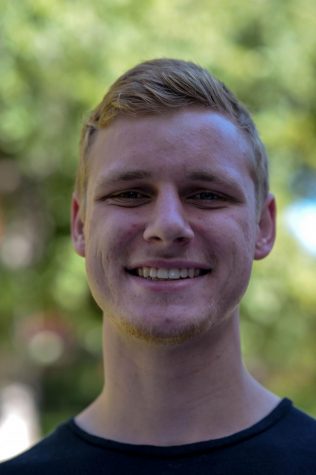WSU grapples with poor faculty retention, recruitment amid compensation request
WSU lags 20 percent behind peer institutions in pay, submitted largest funding request in years; gender-wage disparities despite time spent within university system
COURTESY OF ALEXANDRIA OSBORNE
Downtown revitalization and supporting the Pullman Moscow Regional Airport are among the city council’s top priorities in the coming legislative agenda
January 19, 2023
Vacant positions are piling up at WSU as a funding request from the state Legislature attempts to provide faculty with competitive salaries.
If approved, the $34.5 million request could provide WSU faculty, professional staff and graduate students with a 4% salary increase in the fiscal year 2023 and another 3 percent in 2024.
WSU’s formal decision package, submitted to the state budget office as part of the request, noted that the university lags 20% behind average peer institutions in terms of pay.
Several departments at the university are struggling to fill empty positions, but at the same time, lack the financial resources to hire at a competitive salary, said Phil Weiler, WSU vice president of marketing and communications.
Instead, positions are left vacant and their responsibilities are added onto other faculty members’ workloads, he said.
“Salaries in the state of Washington for public universities are pretty low, so much so that we have a tendency to lose a lot of faculty to universities in other states,” Weiler said.
Last year, the university requested $10 million to increase salaries and pay but only secured $7.5 million. Those funds provided one of the first system-wide raises in years, a 2.5% increase that took effect in September. The request is the largest in seven years.
Chris Mulick, WSU director of state relations, said when the Legislature approves less funding than requested, they expect the university to make up for the difference. That usually comes in the form of tuition revenue.
However, the university experienced a 7.7% drop in enrollment throughout 2022, so WSU asked the Legislature to provide the amount in full. Mulick said state guidelines dictate how much administrators can raise tuition each year, but despite annual increases, the revenue cannot keep up.
“Employee compensation remains our highest priority heading into the next budget cycle,” WSU President Kirk Schulz said in a press release in September 2022. “We will work hard to ensure our faculty and staff are competitively compensated in the years to come.”
Jill McCluskey, director of WSU’s School of Economic Sciences and Regents professor, said the lack of competitive pay is only a piece of the problem. Issues with gender inequity compound the problem with retention and act as another deterrent alongside non-competitive salaries.
The 2020 WSU Salary Equity Study, to which McCluskey contributed, found tenure-line women earn around 2.6% less annual salary than their male counterparts; and career-track women brought in approximately 6.4%less.
She said there were instances of women being paid less even when they had worked at the university longer than their male colleagues. McCluskey is concerned that some women faculty do not feel as valued as they should, noting respect is a factor of retention as well as salary.
“When I first started, I felt like I was treated differently,” McCluskey said, “like I sort of had to prove that I was worthy.”
Chad Kruger, director of WSU’s Center for Sustaining Agriculture & Natural Resources in Wenatchee and Mount Vernon’s Northwestern Washington Research & Extension Center, said his department has struggled with staff retention and recruitment for the last few years.
The WSU College of Agricultural, Human, and Natural Resource Sciences employs several classified staff members, meaning nonteaching personnel. Kruger said that lately, the turnover for these positions is very high in large part due to a lack of competitive pay.
“It’s hard to maintain your preeminence as a top-notch research entity,” he said, “when just about every time you get someone trained and they’re hitting on all cylinders, they leave and you’re starting all over again.”
Monthly salaries for classified staff range from a minimum of $2,635 to a maximum of $8,421, but only for a few positions, according to the WSU Human Resource Services salary schedule. Classified staff does not include career or tenure-track faculty members.
The state determines what rate to pay classified staff members, so their salaries depend more upon Olympia than WSU. Kruger said if the university’s compensation funding is approved, the raises will not extend to classified staff; the state must approve and implement those increases.
WSU also requested identical salary increases for civil service employees, the university’s classified staff, according to its formal decision package; however, the system-wide faculty raises are not contingent on this.
Mohammad Ghaedi left his role as a lecturer at WSU after his one-year contract ran out upon finishing graduate school.
Now a faculty member at George Washington University in Washington, D.C., Ghaedi said he makes less than before while also having a higher cost of living. In his new classrooms, there are blackboards instead of whiteboards, and also issues with the air conditioning system.
He said WSU’s resources surpass other universities; students and faculty are provided with great teaching and learning environments that struggle to compare.
“WSU was among my best memories of places I’ve ever taught,” Ghaedi said.
If it were not for his new girlfriend, he said he would rather live in Pullman; but WSU did not extend the opportunity to stay due to budget constraints.
Kanale Rhoden recently left his position as a career-track faculty member to take a job that offered higher pay and a clearer career path.
Rhoden’s portfolio and role as a career-track professor limited his opportunities to progress further in a department to which he had already dedicated 10 years. He said that during the last four years of his professorship, he felt he could provide something more to a different organization.
Although becoming a professor was his dream job, Rhoden joined Schweitzer Engineering Laboratories as an internal communication specialist. He continues to teach one class as an adjunct at WSU.
“When I got offered the job at SEL,” he said, “and the pay was significantly higher than the teaching pay, it doesn’t hurt to say yes.”
Editor’s note: Since this article was completed, Kanale Rhoden has returned to WSU part-time, but only to teach one class. He is still employed full-time by Schweitzer Engineering Laboratories and spends much of his work week there.










